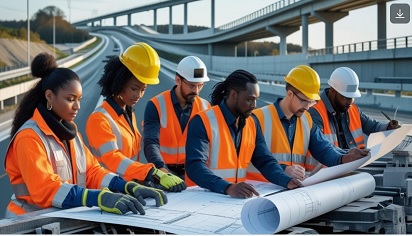Germany Work Visa Jobs for African Construction Workers

Germany Work Visa Jobs for African Construction Workers: Germany is one of the leading economies in Europe with a booming infrastructure and construction industry. In recent years, the country has experienced a shortage of skilled and semi-skilled labor, particularly in the building and civil engineering sectors. This shortage has created opportunities for foreign workers, including Africans, to secure stable and well-paying jobs in Germany through legal work visa programs.
For African construction workers from Nigeria, Ghana, Kenya, South Africa, and other nations this is not just a job opportunity; it’s a pathway to a better standard of living, exposure to advanced construction technology, and the chance to earn salaries far higher than in their home countries.
This guide will walk you through everything you need to know about Germany work visa jobs for African construction workers in 2025 from visa requirements, employer lists, and salary ranges to application steps, job portals, and living conditions.
Why Germany is Recruiting African Construction Workers
Germany’s construction industry is expanding rapidly due to:
-
Urban infrastructure upgrades
-
Public housing projects
-
Road expansion programs
-
Industrial plant construction
-
Green energy facility development
According to industry statistics, Germany needs thousands of skilled workers in:
-
Masonry
-
Carpentry
-
Civil engineering
-
Road construction
-
Painting and finishing
-
Heavy equipment operation
Key SEO keywords here: Germany construction jobs for Africans, work visa construction jobs Germany, Germany hiring African workers, Germany civil engineering jobs for foreigners.
Germany Work Visa Jobs for African Construction Workers
Types of Construction Jobs Available for Africans in Germany
If you are an African worker with experience in any of these areas, you can apply for openings in 2025:
-
Bricklayers and Masons – building walls, laying bricks, and stonework.
-
Carpenters – wood construction for roofs, interiors, and structures.
-
Concrete Workers – pouring and setting concrete for foundations.
-
Road Construction Workers – asphalt laying, pavement, and road repairs.
-
Civil Engineers – managing large infrastructure projects.
-
Heavy Machinery Operators – cranes, excavators, loaders.
-
Painters and Decorators – finishing work for residential and commercial buildings.
-
Plumbers and Pipefitters – essential in new builds and renovations.
Average Salaries for Construction Workers in Germany (2025)
One of the main attractions for African workers is the competitive salary.
| Job Role | Monthly Salary (€) | Monthly Salary (₦) (approx.) |
|---|---|---|
| General Construction Laborer | €1,800 – €2,400 | ₦3,000,000 – ₦4,000,000 |
| Skilled Mason | €2,300 – €2,800 | ₦3,800,000 – ₦4,700,000 |
| Civil Engineer | €3,000 – €4,500 | ₦5,000,000 – ₦7,500,000 |
| Road Worker | €2,200 – €2,700 | ₦3,600,000 – ₦4,500,000 |
| Crane Operator | €2,500 – €3,500 | ₦4,200,000 – ₦5,800,000 |
Visa Pathways for African Construction Workers
If you are a foreigner from Africa, the most common visas are:
-
Germany Skilled Worker Visa – For those with vocational training or professional certificates.
-
Germany Work Visa – For job offers that do not require university degrees but require proof of experience.
-
Germany Blue Card – For highly qualified professionals like engineers.
-
Seasonal Work Visa – For temporary construction projects (6–9 months).
Step-by-Step Guide to Applying for Germany Work Visa Jobs
Step 1: Search and Apply for Jobs
-
Use German job portals like StepStone, Indeed Germany, and Jobbörse.
-
Target construction companies known to hire foreign labor.
Step 2: Secure a Job Offer
-
Employers must issue a written contract.
-
Include job description, salary, working hours, and accommodation details.
Germany Work Visa Jobs for African Construction Workers
Step 3: Apply for Work Visa
-
Submit an application to the German embassy in your country.
-
Required documents:
-
International passport (valid at least 12 months)
-
Job contract from German employer
-
Proof of accommodation in Germany
-
CV and work experience certificates
-
Proof of health insurance
-
Visa application fee payment
-
Step 4: Attend Visa Interview
-
Answer questions about your work experience, employer, and plans in Germany.
Step 5: Relocate and Start Work
-
Upon visa approval, travel to Germany and begin your job.
Top German Employers Recruiting African Construction Workers
-
Hochtief AG– Major civil engineering and building projects.
-
STRABAG SE – Road construction and public works.
-
Züblin AG– Infrastructure and tunneling projects.
-
Max Bögl Group – Bridges, railways, and industrial plants.
-
Bauer AG – Specialized foundation engineering.
-
Bilfinger SE – Industrial construction.
Best Job Portals for Germany Construction Jobs
-
Jobbörse (German Federal Employment Agency)
-
StepStone.de
-
Indeed.de
-
MyHammer.de (construction trades)
-
Work in Germany (Make-it-in-Germany.com)
Cost of Living for Construction Workers in Germany
-
Accommodation: €300 – €600/month
-
Food: €200 – €300/month
-
Transport: €50 – €100/month
-
Utilities & Internet: €80 – €150/month
Germany Work Visa Jobs for African Construction Workers
Benefits of Germany Work Visa Jobs for Africans
-
High salaries compared to African countries.
-
Paid annual leave (20–30 days/year).
-
Free or subsidized accommodation in some contracts.
-
Health insurance coverage.
-
Opportunities for permanent residency.
Testimonials
Moses A. (Nigeria) – “I moved to Berlin in 2024 to work as a road construction worker. My employer provided accommodation, and I now earn enough to send money home every month.”
Fatou S. (Senegal) – “Working in Germany as a crane operator has changed my life. The salary and job security are amazing.”
Frequently Asked Questions
Q1: Do I need German language skills?
Basic German is recommended, but many companies accept English-speaking workers.
Q2: Can I bring my family?
Yes, after you have a residence permit, you can apply for family reunification.
Q3: Is visa sponsorship available?
Yes, many employers sponsor work visas for skilled workers.
Q4: How long does visa processing take?
Usually between 6–12 weeks.
Conclusion
Germany’s construction industry offers lucrative and stable employment for African workers in 2025. With the right qualifications, a legal work visa, and a reputable employer, you can secure a job that not only pays well but also offers opportunities for career growth and long-term settlement in Europe.





One Comment